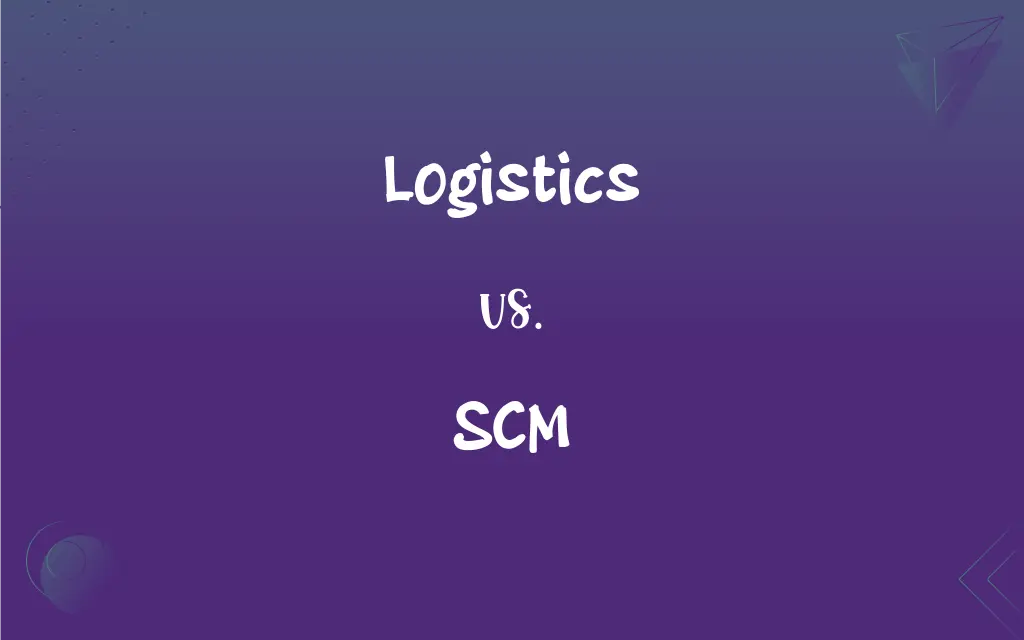Logistics vs. SCM: What's the Difference?
Edited by Aimie Carlson || By Harlon Moss || Published on February 3, 2024
Logistics refers to management of material flow and services; SCM refers to coordination of a business's supply chain.

Key Differences
Logistics involves managing the flow of goods, services, and information from origin to consumption. It ensures the efficient transfer of products. In contrast, Supply Chain Management (SCM) oversees the entire supply chain, from raw material procurement to final product delivery. SCM is more holistic, encompassing logistics as one of its elements.
In logistics, the focus is on transportation, warehousing, inventory management, and order fulfillment. It's a segment of the SCM process, dealing specifically with the planning, implementation, and control of the efficient flow and storage of goods. SCM, however, is a broader term that includes logistics. It also involves aspects like sourcing and procurement, production planning, and customer service.
Logistics plays a crucial role in ensuring that the right products are delivered to the right location on time, safely, and cost-effectively. It's a tactical approach, dealing with the day-to-day movement of goods. SCM, on the other hand, takes a strategic approach. It looks at the bigger picture, optimizing the entire supply chain, creating synergy between different processes, and improving customer value.
In logistics, performance metrics typically revolve around transportation times, shipping costs, and delivery accuracy. For SCM, the metrics are more comprehensive, including measures of overall supply chain efficiency, cost-effectiveness, and customer satisfaction. SCM aims to provide a competitive advantage by enhancing the flow of goods and information through strategic coordination.
Logistics is often considered a subset of SCM. While logistics focuses on specific tasks within the supply chain, SCM encompasses a broader range of activities. SCM integrates logistics with supply chain partners to optimize the entire process, from product development to the end customer, for efficiency and effectiveness.
ADVERTISEMENT
Comparison Chart
Scope
Focuses on transportation, warehousing, and distribution of goods.
Encompasses the end-to-end management of the supply chain, from sourcing to final delivery.
Objective
Efficient and effective movement and storage of goods.
Strategic optimization of the entire supply chain for competitive advantage.
Role in Supply Chain
A component of SCM, dealing with specific operational activities.
Overarching management of the supply chain, integrating logistics with other functions.
Key Activities
Transportation management, warehousing, inventory control.
Sourcing and procurement, production planning, logistics, customer service.
Performance Metrics
Transportation times, shipping costs, delivery accuracy.
Supply chain efficiency, cost-effectiveness, customer satisfaction.
ADVERTISEMENT
Logistics and SCM Definitions
Logistics
Logistics is the detailed organization and implementation of a complex operation involving goods.
Good logistics management is key to maintaining a steady supply of inventory.
SCM
SCM encompasses the management and oversight of a product's entire life cycle from raw material to end-user.
Through effective SCM, the company was able to reduce production costs and increase market responsiveness.
Logistics
Logistics is the management of the flow of goods between the point of origin and the point of consumption.
The company improved its profits by optimizing its logistics operations to reduce transportation costs.
SCM
SCM is the holistic approach to managing the flow of goods and services from suppliers to consumers.
Enhanced SCM strategies allowed for improved supplier relationships and product quality.
Logistics
Logistics encompasses the planning, implementation, and coordination of product movement and storage.
Efficient logistics is crucial for ensuring timely delivery of products to customers.
SCM
SCM is the strategic coordination of business functions to achieve an efficient and effective supply chain.
The firm's success in SCM contributed to its ability to consistently meet customer demand.
Logistics
Logistics focuses on the movement, warehousing, and processing of goods.
The logistics department collaborated with carriers to streamline cross-border transportation.
SCM
SCM includes planning, executing, controlling, and monitoring supply chain activities.
By improving SCM, the company could better forecast demand and streamline its inventory management.
Logistics
Logistics involves controlling the transport and storage of goods in a supply chain.
The logistics team worked overtime to ensure all shipments reached their destinations before the holiday season.
SCM
SCM involves coordinating and integrating the flow of materials, information, and finances across the entire supply chain.
Strong SCM practices helped the company navigate the complexities of global sourcing and distribution.
Logistics
The aspect of military operations that deals with the procurement, distribution, maintenance, and replacement of materiel and personnel.
Logistics
The management of the details of an operation.
Logistics
(operations) The process of planning, implementing, and controlling the efficient, effective flow and storage of goods, services and related information from their point of origin to point of consumption for the purpose of satisfying customer requirements.
Logistics
(military) The procurement, supply, maintenance, and transportation of equipment, facilities, and personnel.
Logistics
That branch of the military art which embraces the details of moving and supplying armies. The meaning of the word is by some writers extended to include strategy.
Logistics
The planning and coordination of the movement of materials, and other details of any large activity, such as a business or a political campaign.
Logistics
A system of arithmetic, in which numbers are expressed in a scale of 60; logistic arithmetic.
Logistics
Handling an operation that involves providing labor and materials be supplied as needed
FAQs
What are the main objectives of SCM?
SCM aims to optimize the entire supply chain, enhance efficiency, reduce costs, and improve customer satisfaction.
What are the key activities in logistics?
Key logistics activities include transportation, warehousing, and inventory management.
How does logistics fit into SCM?
Logistics is a key component of SCM, focusing on the efficient movement and storage of goods.
What is logistics?
Logistics is the management and coordination of moving goods from origin to destination.
Can a company have SCM without logistics?
Logistics is an integral part of SCM, so SCM inherently includes logistics.
Why is SCM important?
SCM is crucial for coordinating all supply chain activities and ensuring overall efficiency and effectiveness.
What role does technology play in logistics?
Technology enhances logistics operations through improved tracking, efficiency, and automation.
What does SCM stand for?
SCM stands for Supply Chain Management.
What trends are shaping SCM today?
Current SCM trends include increased use of AI and automation, focus on sustainability, and supply chain resilience.
How does SCM contribute to a company’s success?
Effective SCM leads to cost reductions, improved product quality, and better customer service, contributing to overall success.
What is the difference between inbound and outbound logistics?
Inbound logistics refers to the transport, storage, and receipt of goods coming into a business, while outbound logistics involves the movement of goods going out.
What skills are important in SCM?
Key SCM skills include strategic planning, problem-solving, and collaboration.
How can logistics be made more sustainable?
Sustainable logistics can be achieved through eco-friendly transportation modes, reducing waste, and optimizing routes.
What is the future of SCM and logistics?
The future of SCM and logistics likely involves increased digitalization, more sustainable practices, and greater integration of technology for efficiency and responsiveness.
How do companies measure logistics performance?
Performance in logistics is measured by delivery accuracy, transportation times, and cost efficiency.
How does logistics impact customer satisfaction?
Efficient logistics ensures timely delivery and product availability, directly impacting customer satisfaction.
What is the role of suppliers in SCM?
Suppliers are critical in SCM, providing the necessary materials and components for production.
What is a supply chain network?
A supply chain network is the interconnected system of organizations, people, activities, information, and resources involved in moving a product from supplier to customer.
How does inventory management relate to logistics?
Inventory management is a key aspect of logistics, ensuring that the right products are available at the right time and place.
What are some challenges in SCM?
Challenges in SCM include managing supply chain complexity, maintaining visibility, and adapting to market changes.
About Author
Written by
Harlon MossHarlon is a seasoned quality moderator and accomplished content writer for Difference Wiki. An alumnus of the prestigious University of California, he earned his degree in Computer Science. Leveraging his academic background, Harlon brings a meticulous and informed perspective to his work, ensuring content accuracy and excellence.
Edited by
Aimie CarlsonAimie Carlson, holding a master's degree in English literature, is a fervent English language enthusiast. She lends her writing talents to Difference Wiki, a prominent website that specializes in comparisons, offering readers insightful analyses that both captivate and inform.







































































